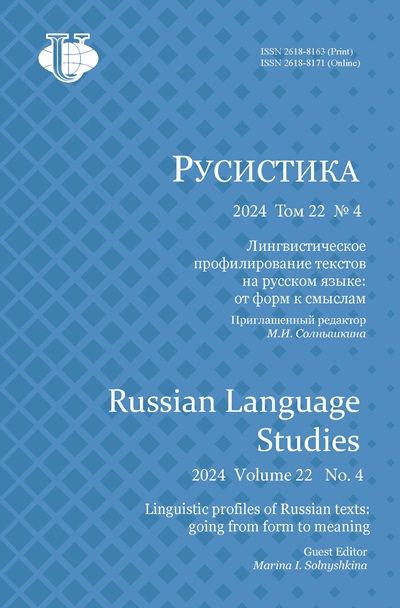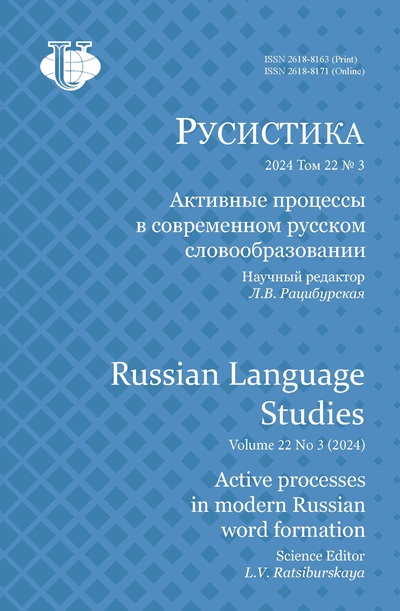Language form compression in modern Russian speech
- Authors: Markova E.M.1,2
-
Affiliations:
- The Kosygin State University of Russia
- University of Economics in Bratislava
- Issue: Vol 22, No 3 (2024): ACTIVE PROCESSES IN MODERN RUSSIAN WORD FORMATION
- Pages: 375-391
- Section: Actual Problems of Russian Language Studies
- URL: https://journals.rudn.ru/russian-language-studies/article/view/41853
- DOI: https://doi.org/10.22363/2618-8163-2024-22-3-375-391
- EDN: https://elibrary.ru/SMXPSU
Cite item
Full Text
Abstract
Compressive word formation results from the active tendency to save speech effort and, accordingly, to save linguistic means, which makes its research relevant. At the lexical level, the principle of economy is realized in constriction, truncation, semantic condensation, i.e. processes based on reduction, minimization of structures. The aim of the study is to identify and fix the manifestations of this tendency in modern Russian speech, to generalize the ways of linguistic compression as mechanisms of its representation, to establish their universality and specificity in the Russian language in the pan-Slavic context. The research material is Internet resources, dictionaries of neologisms, the Russian national corpus, the speech of young people. The material was analyzed with both general scientific (relevant material collection, observation, analysis, systematization, description, interpretation), and linguistic methods (methods of word-formation, component, contextual, comparative analysis; structural-semantic method; method of modeling the derivational basis). Among extralinguistic and linguistic reasons for active compression word production, the author points out the influence of the English language as the most important factor, acting both as a donor of short lexical units and as a translator of derivation methods and mechanisms. Among the compression phenomena in modern speech, the article considers such phenomena as borrowings, collocations, composites, clipping, derivation with zero affixation, univerbation, semantic condensation. It is revealed that form compression not only strengthens its communicative function, but also, due to the pragmatic possibilities of the compression, increases its emotional-evaluative and relational functions. The analysis of the main manifestations of form compression in modern Russian speech allows us to conclude that they are universal, but at the same time have some specific features due to the specific national derivational system.
About the authors
Elena M. Markova
The Kosygin State University of Russia; University of Economics in Bratislava
Author for correspondence.
Email: elena-m-m@mail.ru
ORCID iD: 0000-0001-6620-1567
SPIN-code: 6343-8410
Doctor of Philology, Professor of the Department of Russian as a Foreign Language, Kosygin State University of Russia; Professor of the Department of Romance and Slavic Languages of the Faculty of Applied Languages, University of Economics in Bratislava
1 Malaya Kaluzhskaya St, Moscow, 119071, Russian Federation; 1 Dolnozemska, Bratislava, 85235, Slovak RepublicReferences
- Bozděchová, I. (2017). Anglicisms in the Czech lexicon. In P. Karlík, M. Nekula & J. Pleskalová (Eds.), New encyclopedic dictionary of Czech. Retrieved from: https://www.czechency.org/slovnik/ANGLICISMY%20V%20ČESKÉM%20LEXIKU
- Cherchuk, O.I. (2023). Borrowings in the modern Czech language. (Candidate dissertation, Moscow). (In Russ.).
- Děngeová, Z. (2015). Internet and new verbal naming. Change of language and its research in the age of new media and technologies (pp. 67–71). Prague: Czech Language Institute. Retrieved from: http://www.ujc.cas.cz/miranda2/export/sitesavcr/ujc/sys/galeriedownload/sbornik/brling.pdf
- Dmitrieva, S.O. (2024). Dynamics of the youth slang lexicon: Linguo-sociocultural and lexicographic aspects. [Author’s abstr. dr. philol. diss.]. Kaliningrad. (In Russ.).
- Dozorova, D. (2015). Thematic spheres of univerbs usage in modern Russian speech. Bulletin of the Moscow State Regional University, (1). (In Russ.). https://doi.org/10.18384/2224-0209-2015-1-1030
- Dyakov, A.I. (2015). Statics and dynamics of Anglicisms in the Russian language system: Multi-dimensional linguistic modeling. (Candidate dissertation, Omsk). (In Russ.).
- Furdík, J. (2005). Integration processes in lexical acquisitions. Life with word creation and lexicology (pp. 373–380). Košice: LG Publishing House.
- Horecký, J., Buzássyová, K., Bosák, J. et al. (1989). Dynamics of the vocabulary of contemporary Slovak. Bratislava: VEDA Publ.
- Ivanova, M.V., & Klushina, N.I. (2021). Russian language in the modern Internet space: dynamic processes and development trends. Russian Language Studies, 19(4), 367–382. (In Russ.). http://doi.org/10.22363/2618-8163-2021-19-4-367-382
- Ishchenko, I.G. (2020). Compressive word formation in modern English. Bulletin of Amur State University, (90), 96–100. (In Russ.).
- Klobukov, E.V., & Gudilova, S.V. (2001). Linguistic specificity of non-derivative compound words (quasi-composites). Language, consciousness, communication, (20), 12–25. (In Russ.).
- Limarova, E.V., & Son, L.P. (2018). Internet slang: word formation processes (based on the material of English and Russian languages). Bulletin of Chelyabinsk State University, (4), 111–119. (In Russ.).
- Malinina, I.A. (2011). Conversion formation of new lexical units. Young scientist, 10(2), 21–23. URL: https://moluch.ru/archive/33/3742 (In Russ.).
- Markova, E.M. (2023). Verbal univerbation as one of the modern derivational trends. VERBA. Northwestern Linguistic Journal, (1), 61–71. (In Russ.). https://doi.org/10.34680/VERBA-2023-1(6)-61-71
- Markova, E.M. (2012). The law of economy of linguistic means in the aspect of linguistic convergence of modern Slavic languages. Rational and emotional in the Russian language (pp. 318–322). Moscow: MGOU Publ. (In Russ.).
- Markova, E.M., & Grigoryanova, T. (2016). Dynamic aspects of the vocabulary of modern Slavic languages. Brno: Tribun EU Publ. (In Russ.).
- Marsheva, L.I. (2004). Trends towards analyticism, or prerequisites? Vestnik Pravoslavnogo Sviato-Tikhonovskogo Gumanitarnogo Universiteta, (2), 49–59. (In Russ.).
- Neshchimenko, G.P. (2000). Word formation of the spoken language in the light of the trend of language economy (based on the Russian and Czech languages). Wortbildung: Interaktiv im Sprachsystem. Materialen der 3. Konferenz der Kommission für slawische Wortbildung beim internationalen Slawistenkomitee (pp.253–270). Innsbruck. (In Russ.).
- Nekula, M. (2017). Adaptation of loans. New encyclopedic dictionary of Czech. In Karlík P., Nekula M., Pleskalová J. Retrieved from: https://www.czechency.org/slovnik/
- Nikolina, N.A. (2021) Types of derivatives-truncations in modern Russian speech. Russian Language at School, (3), 69–74. (In Russ.).
- Norman, B.Yu. (2021). About semantic-syntactic contraction, or What do we mean when we don’t say something out loud? Russian Language at School, 82(1), 86–91. (In Russ.). https://doi.org/10.30515/0131-6141-2021-82-1-86-91
- Palková, L. (2018). Univerbization in Slovak. Prešov: FF PU in Prešov.
- Petrukhina, E.V. (2010). Possibilities, functions, and competitors of word production in the modern Russian language. New phenomena in Slavic word formation: System and functioning (pp. 424–443). Moscow: MSU Press Publ. (In Russ.).
- Pletneva, N.V. (2005). On the reasons for the formation of abbreviated lexical units. Text in cultural and historical context (pp. 104–108.). Ekaterinburg: Ural Univ. Publ. (In Russ.).
- Ratsiburskaya, L.V., & Zhdanova, E.A. (2021). Specificity of Russian media new formations in the reflection of social realities. Russian Language Studies, 19(4), 446–480. (In Russ.). http://doi.org/10/22363/2618-8163-2021-19-4-466-480
- Romanov, Yu.A. (2015). Univerbation based on verb phrases in English and Russian. International Humanitarian University Herald. Philology, 18(2), 117–120. (In Russ.).
- Severova, N.V. (2018). Abbreviations as a productive way to replenish the vocabulary of modern languages. Bulletin of Donetsk National University, (4), 149–155. (In Russ.).
- Shmidt, E.S. (2023). New borrowings as elements of Russian vocabulary: A systemic aspect. Tomsk State University Journal, (494), 53–59. https://doi.org/10.17223/15617793/494/6 (In Russ.).
- Šimandl, J. (2013). Mechanical shortening and mechanical folding; blending. Problems of neology in the Slavic language, (6), 109–119. Retrieved from: http://lexiko.ujc.cas.cz/index.php?page=14&idStudie=48
- Smirnitsky, A.I. (1953). The so-called conversion and alternation of sounds in the English language. Foreign languages at school, (5), 21–31. (In Russ.).
- Ustimenko, I.A. (2007). The phenomenon of semantic condensation in Russian word formation. Belgorod: BelGU Publ. (In Russ.).
- Volodina, K.A. (2012). Word-formation means that implement the principle of economy within the framework of English and German texting. Bulletin of the Moscow State Regional University. Series “Linguistics”, (6), 54–57. (In Russ.).
- Yanko-Trinitskaya, N.A. (2001). Word formation in modern Russian. Moscow: Indrik Publ. (In Russ.).
















